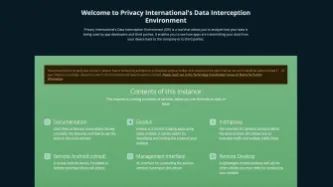Search
Content type: Guide step
Whatsapp (owned by META) is one of the most popular end-to-end encrypted messaging service. If you use it on your day-to-day it's worth reviewing some of your current settings and how you are making use of the platform.
This guide includes:
Chat backup settings
Visibility settings
App permissions
Managing desktop sessions
App security and two-factor authentication
Good Practises
Chat backup settings
This is one of most important settings to consider in WhatsApp. Because WhatsApp is end to end…
Content type: Advocacy
The meeting brought together representatives from UN bodies, civil society, academia, and election oversight institutions. Participants agreed that while digital technologies can improve electoral access and administration, they also pose serious threats to human rights, including privacy, freedom of expression, participation in public affairs, and equality, as well as democratic accountability if left unregulated. Discussions focused on three core areas: the role of national authorities, the…
Content type: Advocacy
The International Labour Organisation (ILO) is developing standards for decent work in the platform economy. Gig workers are exposed to a range of harms because of the precarious nature of their work and the use of opaque algorithms to manage them.Privacy International has come together with Human Rights Watch, TEDIC, IT for Change, Derechos Digitales and more than 30 other organisations to demand that this new ILO standard puts a stop to harmful practice, protects and promotes workers' rights…
Content type: Long Read
Period tracking apps and the rollback of reproductive rightsThe aftermath of the overturning of Roe v. Wade in the United States (US) sparked widespread debate and concern that data from period tracking apps could be use to criminalise those seeking abortion care.While the surveillance and criminalisation of reproductive choices are neither new nor unique to the US, the scale and intensity of today’s crisis continue to grow. To put it into perspective, 22 million women and girls of reproductive…
Content type: News & Analysis
Layla looks at her calendar on her phone. She’s in charge of planning her book club’s monthly meeting. After thinking for a second, she summons her AI assistant: “Hey Assistant, can you book me a table at that tapas restaurant I read about last week, and invite everyone from the book club? The restaurant should be in my browsing history. Let me know if the journey is more than 1-hour for anyone”. As the assistant compiles a response, she wonders if anyone else will hear this.Technology has made…
Content type: Advocacy
The Open informal consultations on lethal autonomous weapons systems, held in accordance with General Assembly resolution 79/62 at the UN in New York on 12-13 May 2025, examined various legal, humanitarian, security, technological, and ethical aspects of these weapons. These consultations aimed to broaden the scope of AWS discussions beyond those held by the Group of Governmental Experts (GGE) at the UN in Geneva. Find out more about what happened during the discussions at Researching Critical…
Content type: Video
It's our first time attempting a video podcast, so please let us know what you think by dropping us an email at [email protected]! Read more about our challenge against the UK's secret TCN powers.
Content type: Long Read
If you’ve ever used TikTok, Instagram, or X/Twitter, you will already be familiar with centralised social media.Centralised social media means big company owns the app, controls the software, and keeps all your data.For example, ByteDance makes TikTok. They own it, run the servers, decide what you see in your feed, and hold onto every video you like or comment on. They call the shots when it comes to your data.But what if social media didn’t work that way? What if no single company was in…
Content type: Long Read
Go back to the report page Methodology We looked at the top period tracking apps downloaded in the Google Play Store, some of which we had examined in our original research, and some of which are newly emerging apps that have since grown in popularity. The top period-tracking apps with the most downloads included Flo; Period Tracker by Simple Design; and apps we'd tested in our previous research that still exist such as Maya, Period Tracker by GP Apps, as well as several apps popular…
Content type: Long Read
Go back to the full report page Flo, headquartered in London, UK, is one of the most popular period-tracking apps on the market with over 380 million downloads. The app was previously accused of sharing data with Facebook, such as informing Facebook whenever a Flo user was on their period or if they intended to get pregnant. In 2021, the U.S. Federal Trade Commission (FTC) reached a settlement with Flo to undergo an audit of their privacy policy and to obtain user permissions before…
Content type: Long Read
Go back to the full report pagePeriod Tracker by Simple Design is another popular period tracking app that has over 150 million users. To begin using this app the user answers a set of three onboarding questions for about their cycle pattern. The user has the option to answer 'I'm not sure' for each question. After answering 'I'm not sure' for these three questions, we were able to proceed on the app without having to create an account. Throughout our experience inputting our cycle…
Content type: Long Read
Go back to the full report pageThe Maya app is a period tracker app by Plackal Tech based in India. In our previous investigation, we revealed Maya was sharing a plethora of user input data to Facebook. However, in response to our 2019 research, the app claimed it had since ‘removed both the Facebook core SDK and Analytics SDK from Maya’ while ‘continu[ing] to use the Facebook Ad SDK, post opt-in to our terms and conditions and privacy policy’ for revenue purposes, the latter of which 'does not…
Content type: Long Read
Go back to the full report pagePeriod Tracker by GP Apps is another popularly downloaded app we previously looked at in 2019. In our original research, we determined that this app did not appear to share any user input data with Facebook. This time, we examined the third parties that the app appeared to integrate and what kind of data was being shared with these third parties, as well as what user data the app was storing on its own or external services. It’s worth noting that the…
Content type: Long Read
Go back to the full report pageThe WomanLog app, developed by Pro Active App SIA, is a Latvia-based period tracking app with over 10 million downloads that features an 'Intelligent Assistant' chatbot (more on this below). To get started on the app, we completed a short onboarding questionnaire about which app mode we intended to use (e.g., standard) and the length of our cycle and period. Our answers to these questions were sent across the web traffic to the app developer's API:
Content type: Long Read
Go back to the full report pageWocute is a Singapore-based period tracking app with over 5 million global downloads. To get started on the app, a user first needs to complete a short onboarding questionnaire about their goal for using the app ('track my cycle'); their year of birth (which we skipped), followed by the length of their period cycle and start date of their last period (for which we selected 'I'm not sure'). These responses were all communicated to the API:
Content type: Long Read
Go back to the full report pageStardust is a New York-based astrology-themed period tracking app that has recently risen in popularity, having received a spike in downloads in the U.S. following the overturning of Roe v. Wade. According to its website, the app takes a de-identification approach to users' privacy by utilising a third party 'security system' operated by Rownd, “an authentification platform that stores your contact information for us [Stardust] so that we cannot associate your…
Content type: Long Read
Go back to the full report pageThe last app we looked at was Euki, which has been recognised among privacy advocates. The app is a U.S. non-profit privacy-by-default period tracker app founded by a group of social tech and sexual and reproductive health organisations like Digital Defense Fund and Ibis Reproductive Health. The app has recently become open-source. We ran the Euki app through the DIAAS environment to observe its web traffic as for the above apps. There were no onboarding…
Content type: Long Read
Go back to the full report pageLimitationsBefore our analysis, we note the technical limitations (and the scope of our research) meant we did not test certain features mentioned, such as Google Fit integrations offered by some apps. We also mention the limitations of our DIAS environment, which only allows us to see web (client-side) interactions, rather than server-side interactions, the latter of which are increasingly common among more advanced platforms that utilise cloud computing (e.…
Content type: Long Read
Our research has introduced questions about the right to privacy when apps have the potential to share a range of user-related data. This is a particular concern for people using apps in countries where there are restrictions on access to abortion. In the US, after the overturning of Roe v Wade, concerns around the privacy practices of period-tracking apps have been raised in states that have introduced restrictions and bans on access to abortion. It could be very possible for some period…
Content type: Long Read
The security of our devices, applications and infrastructure is paramount to the safe functioning of our digital lives. Good security enables trust in our systems, it is fundamental to protecting the critical information we store and exchange through networks and devices. Similar to how we physically secure our homes, offices and schools, securing devices and software allows us to operate in safe and trusted environments where our security is guaranteed and protected.Security for information…
Content type: News & Analysis
Our partner Transparencia Electoral has created an extensive and interactive index on data protection during elections in Latin America.The index evaluates laws and regulations around data protection during the election cycle in 16 countries in the region: Argentina, Bolivia, Brazil, Chile, Colombia, Costa Rica, Ecuador, El Salvador, Guatemala, Honduras, Mexico, Panama, Paraguay, Peru, the Dominican Republic and Uruguay.Organising elections is a huge government data-gathering exercise. The…
Content type: Long Read
“Hey [enter AI assistant name here], can you book me a table at the nearest good tapas restaurant next week, and invite everyone from the book club?” Billions of dollars are invested in companies to deliver on this. While this is a dream that their marketing departments want to sell, this is a potential nightmare in the making.Major tech companies have all announced flavours of such assistants: Amazon’s Alexa+, Google’s Gemini inspired by Project Astra, Microsoft’s Copilot AI companion and…
Content type: Opportunities
Full time and permanent from London officeSalary: £40,500 full time and permanent from London officeBenefits: 26 days annual leave (plus bank holidays), generous workplace pension, wellbeing support, resources for learning & development, and we can offer a modest relocation fund.Join us: You’re curious about how technologies affect power and shape the future. You’re an advocate who wants to speak out for change with a voice that is both nuanced and engaging. You want to help build…
Content type: Press release
FOR IMMEDIATE RELEASELONDON - 7 April 2025The Investigatory Powers Tribunal (IPT) has confirmed it will hear Privacy International, Liberty and two individuals’ challenge to the legality of the Home Secretary’s decision to use her powers to secretly force Apple to allegedly give the UK Government access to users’ secured data stored on iCloud. The challenge will also cover the legality of the Government issuing these types of notices at all. Privacy International and Liberty,…
Content type: News & Analysis
We’ve been asked a lot lately about whether it is safe to travel, particularly to the US. And it’s not surprising why: the US Government is increasing their cruelty at borders.Border management today is fueled by our data, but government officials want more. They want as much data as they can get to catch you out. They’ve reportedly detained or deported people based on their free speech activities, denying entry on tenuous grounds like having the wrong photos on phones (including in in the ‘…
Content type: Long Read
It’s important to us at PI that we continue to create real change in the world. We want our work to matter, and we challenge ourselves continuously to verify that it does.In 2024 we made substantial progress towards concrete systemic change. We challenged governments and corporations that exploit data and technology, pushed for new national and international policy standards, drove standard-setting action by courts and regulators. We educated and campaigned with others.As a result, we produced…




























